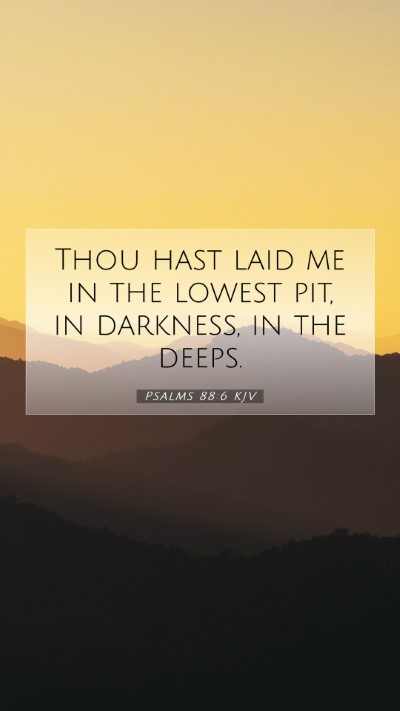Psalms 88:6 - Understanding the Depths of Despair
Bible Verse: Psalms 88:6 - "Thou hast laid me in the lowest pit, in darkness, in the deeps."
This verse is a poignant expression of deep anguish and isolation, depicting the psalmist's feelings of abandonment. In combining the insights from public domain commentaries such as those of Matthew Henry, Albert Barnes, and Adam Clarke, we aim to provide a comprehensive understanding of this powerful verse.
Commentary Overview
The psalm from which this verse is drawn is recognized for its raw emotional tone and lack of resolution, standing apart from many other psalms that typically conclude with praise or hope. Instead, it portrays a deep sense of despair that reflects the struggles faced not just by the individual but by humanity in general.
Matthew Henry's Commentary
Matthew Henry notes that the imagery of being laid in the lowest pit suggests a situation of extreme distress. The term "pit" carries connotations of being trapped, while "darkness" symbolizes the absence of hope or guidance. Henry emphasizes the importance of acknowledging this deep sorrow, as it allows believers to confront their struggles honestly. He believes that such expressions of grief can lead to spiritual growth when brought before God.
Albert Barnes' Commentary
Albert Barnes provides insight on the extremes of the psalmist's plight, indicating that being in "the lowest pit" signifies a state of degradation and despair. His interpretation points out that the "deeps" refers to overwhelming troubles from which one feels there is no escape. Barnes highlights that this verse speaks to the feeling of being overwhelmed and without support, a condition that can resonate with many believers in their moments of trial.
Adam Clarke's Commentary
Adam Clarke interprets the verse with an emphasis on the metaphorical significance of "darkness" in the spiritual journey. He notes that darkness often symbolizes sin and alienation from God. Clarke suggests this verse reflects not only physical despair but also spiritual desolation, where the individual feels cut off from divine presence. He advocates that such expressions serve as reminders of the necessity for seeking God even in our darkest hours.
Key Themes and Insights
- Isolation and Despair: The verse encapsulates the feelings of being utterly alone in times of sorrow, reflecting the human experience of despair.
- The Depths of Emotion: It showcases how deep emotions can be articulated in prayer, which can be a vital part of the believer's relationship with God.
- Spiritual Significance of Darkness: The idea of darkness is interpreted as both a physical state and a spiritual condition, prompting believers to seek light and guidance in God.
- The Importance of Honest Expression: This psalm invites individuals to be raw and honest before God, recognizing that He can handle our deepest fears and sorrows.
Theological Reflection
This verse, while one of lament, serves as a crucial reminder of the value of bringing our fears to God. It sheds light on the broader human condition of experiencing dark periods in life, emphasizing that these moments invite deeper relationship with the Divine. Through studying Psalm 88:6, believers are encouraged to understand that faith is not only about joy and celebration but also about grappling with life’s harsh realities.
Cross-References
- Psalms 30:3: "O Lord, thou hast brought up my soul from the grave: thou hast kept me alive, that I should not go down to the pit."
- Psalms 69:14: "Deliver me out of the mire, and let me not sink: let me be delivered from them that hate me, and out of the deep waters."
- 2 Corinthians 4:8-9: "We are troubled on every side, yet not distressed; we are perplexed, but not in despair; persecuted, but not forsaken; cast down, but not destroyed."
Conclusion
The exploration of Psalms 88:6 offers profound insights into the nature of human emotion and the challenges of faith. This verse not only reflects a cry for help but also serves as a vital reminder for believers to seek and rely on God’s presence, even when navigating the darkest of times. For those engaging in Bible study groups, online Bible study, or utilizing Bible study tools, this passage provides rich material for discussion on the importance of lamentation in faith.
For those interested in understanding Scripture more deeply, this verse exemplifies the need for Bible study insights that encompass both suffering and divine solace. In light of the comments by Henry, Barnes, and Clarke, the verse invites believers to look beyond despair towards the comfort found in God's presence during trials.


